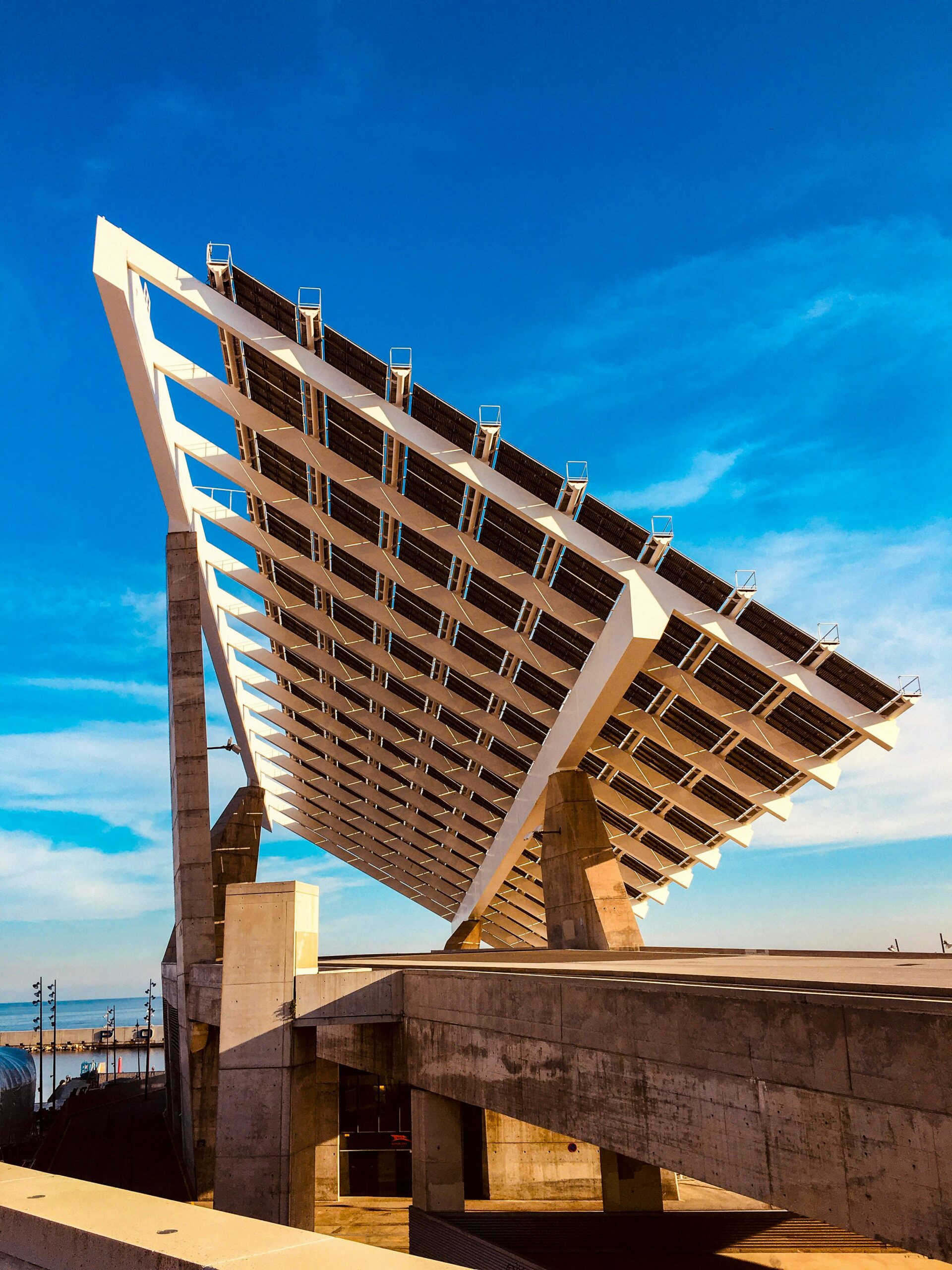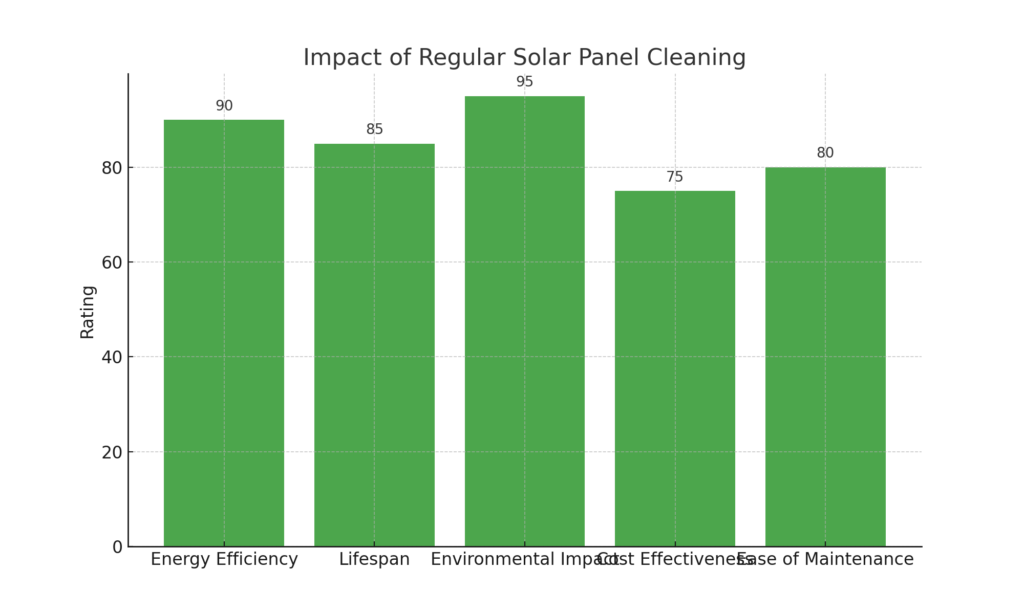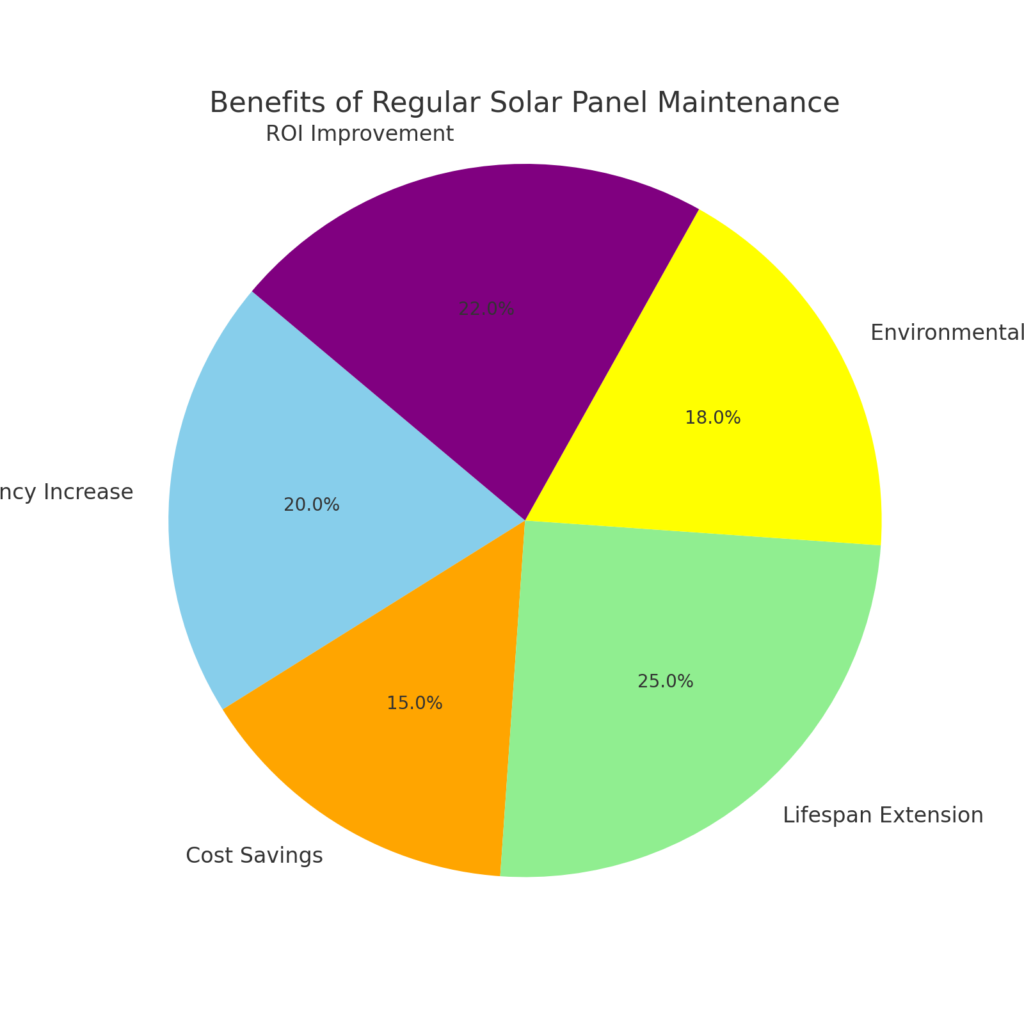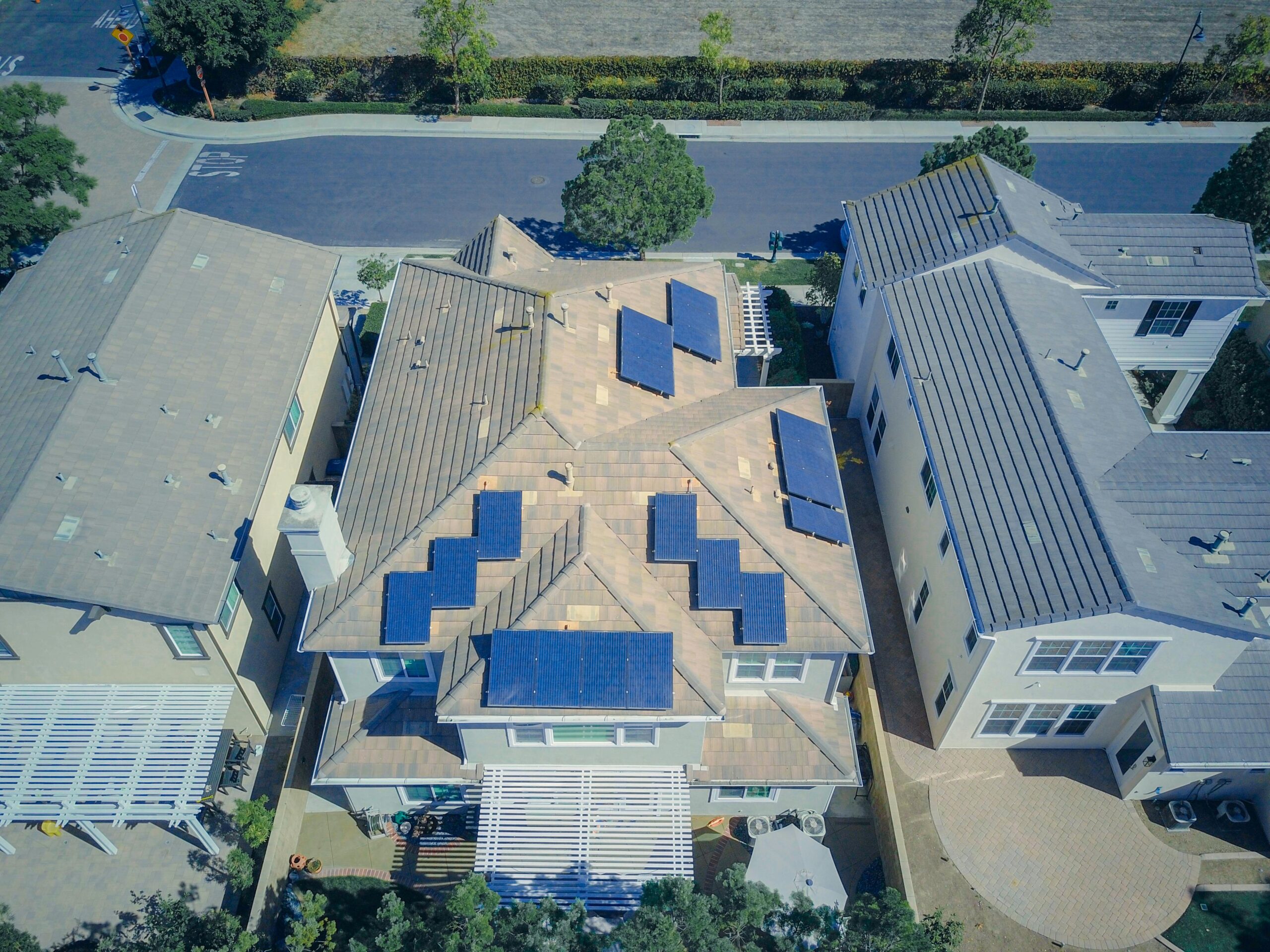Solar panels are a significant investment in renewable energy, and their efficiency hinges heavily on proper maintenance. Learning how to clean solar panels at home is a critical skill for any solar panel owner. It not only boosts the system’s efficiency but also extends its lifespan. In this comprehensive guide, we’ll delve into the reasons why regular cleaning is vital, offer a step-by-step approach to cleaning your solar panels, and provide tips for ensuring safety and environmental responsibility.
Table of Contents
Why Regular Cleaning is Essential for Solar Panel Efficiency

Understanding how to clean solar panels at home begins with recognizing the impact of cleanliness on their performance. Solar panels exposed to the elements can accumulate dust, dirt, bird droppings, and leaves, all of which can obstruct sunlight and reduce energy output. Regular cleaning ensures that these panels can absorb as much sunlight as possible, translating into more electricity generation and higher efficiency.
Step-by-Step Guide: How to Clean Solar Panels at Home
- Safety First: Safety should always be your top priority. Ensure the solar system is turned off before beginning any cleaning procedure. Use a sturdy ladder for rooftop panels, and consider safety gear like gloves and non-slip shoes.
- Soft Brush or Sponge: Used for gently scrubbing the solar panels without scratching or damaging them.
- Bucket: Needed for mixing water and detergent.
- Hose or Additional Bucket of Water: For rinsing the solar panels after cleaning.
- Mild, Biodegradable Detergent: A gentle cleaning agent that won’t harm the solar panels or the environment.
- Brushes and Sponges: These are soft tools that are used to gently scrub the solar panels. The softness is crucial to avoid scratching or damaging the surface of the panels.
- Specialized Detergents: These are cleaning solutions formulated to be effective yet gentle on solar panels. They are often biodegradable, ensuring minimal environmental impact.
- Additional Tools: Depending on the kit, there might be other tools included, such as wipers, scrapers, or even telescopic handles to reach panels that are installed in high or hard-to-reach places.
- These kits are designed to provide an all-in-one solution for solar panel maintenance, ensuring that users have the appropriate tools to clean their panels effectively and safely, thus maintaining their efficiency and prolonging their lifespan. When looking for such kits on Amazon or other retailers, it’s important to consider factors like the quality of the tools, the suitability of the cleaning agents for your specific solar panel type, and the kit’s overall user reviews and ratings.
- Choose the Right Detergent: Opt for a mild, biodegradable detergent. It should be free from harsh chemicals and abrasives. This is not only gentle on the solar panels but also environmentally friendly.
- Mixing Ratio: The exact ratio of detergent to water can vary depending on the detergent’s concentration. A general rule of thumb is to use a small amount of detergent in a large bucket of water. You might start with a few teaspoons of detergent per gallon of water and adjust as needed.
- Test the Solution: Before applying the solution to the entire panel, test it on a small, inconspicuous area. This is to ensure that it doesn’t leave any residue or cause any harm to the panel surface.
- Use Soft Water if Possible: If you have access to soft water, use it to mix your cleaning solution. Hard water can leave mineral deposits on the solar panels.
- Avoid Hot Water: Use lukewarm or cold water for the mixture. Extremely hot water can potentially damage the solar panels, especially if they are very cold before you start cleaning (like early in the morning).
- Stir Gently: Once you add the detergent to the water, stir it gently to mix. Avoid creating too much foam or suds, as this can leave residues on the panels.
- Remember, the goal is to make a solution that is effective in cleaning the panels but gentle enough to preserve their integrity and functionality.
- Gentle Washing: Dip your brush or sponge in the cleaning solution and gently scrub the surface of the panels. Be thorough but gentle to avoid scratching the panels.
- Rinsing the Panels: After scrubbing, rinse the panels thoroughly with clean water. This step is crucial to remove any soap residue.
- Drying: Allow the panels to air dry or use a squeegee to prevent water spots.
Safety Precautions in Cleaning Solar Panels
Grasping how to clean solar panels at home is not just about the cleaning methods themselves but also heavily involves adhering to strict safety precautions. This is crucial to prevent accidents and ensure that the cleaning process is both effective and safe. One of the primary rules when it comes to learning how to clean solar panels at home is never to undertake the task alone, especially if the panels are located on the roof. Working with a partner ensures that someone can hold the ladder steady, pass tools, or call for help in case of an emergency. It’s a simple step, but it significantly increases the safety factor.
Another critical aspect of understanding how to clean solar panels at home is being acutely mindful of electrical safety. Solar panels are, by their nature, electrical devices, and mixing electricity with water can be hazardous. Therefore, it’s essential to ensure that the solar system is turned off before beginning the cleaning process. This precaution helps to prevent any electrical accidents. Additionally, it’s wise to avoid cleaning your solar panels during wet or damp conditions, where the risk of slipping or electrical shock is heightened.
Moreover, when considering how to clean solar panels at home, it’s important to use the right equipment. Non-conductive cleaning tools are a must. Using a long-handled brush or mop can keep you at a safe distance from the panels while cleaning them. In case you need to climb onto the roof, wearing appropriate safety gear, like a harness, non-slip shoes, and gloves, becomes imperative. These pieces of equipment can protect you from falls and give you a better grip, making the cleaning process not only safer but also more comfortable.
In summary, when learning how to clean solar panels at home, prioritizing safety is paramount. Working with a partner, being mindful of electrical safety, and using the correct equipment can ensure that your solar panels are cleaned effectively and safely. Remember, the goal is not only to maintain the efficiency of your solar panels but also to ensure your well-being during the cleaning process.
The Role of Weather in Cleaning Solar Panels
Understanding how to clean solar panels at home requires a keen awareness of the role that weather conditions play in the cleaning process. The efficiency and safety of cleaning solar panels are highly influenced by the prevailing weather conditions. For instance, when planning how to clean solar panels at home, it’s advisable to choose a cloudy day or an early morning time for the task. This timing is strategic because the absence of strong sunlight prevents the quick drying of soap on the panels, allowing for a more thorough cleaning without leaving behind soap residue or streaks.
Moreover, in the journey of mastering how to clean solar panels at home, recognizing the challenges posed by different weather conditions is essential. For those living in colder climates, the approach to cleaning solar panels changes significantly. Winter brings with it the additional task of removing snow or ice from the solar panels. This is a delicate process because improper removal techniques can lead to scratching or damaging the panel’s surface. Therefore, it’s crucial to use soft, non-abrasive tools to gently remove any snow or ice accumulation. Understanding how to clean solar panels at home in such conditions also means avoiding pouring hot water on cold panels, as the sudden temperature change can cause cracking.
Additionally, in areas prone to frequent rain, understanding how to clean solar panels at home involves recognizing that, while rainwater can assist in removing some loose dirt and debris, it often is not sufficient for a thorough clean. Post-rain cleaning is essential to ensure that any mineral deposits or other residues left by rainwater are effectively removed, maintaining the optimal functioning of the solar panels.
In conclusion, the role of weather in cleaning solar panels is a vital consideration for any homeowner looking to maintain their solar installation. Choosing the right weather conditions for cleaning, adopting specific techniques for different climates, and understanding the limitations of natural cleaning agents like rain are all key elements of learning how to clean solar panels at home. By factoring in these considerations, homeowners can ensure their solar panels remain efficient and in good condition year-round.
Environmental Considerations and Eco-Friendly Practices
As solar panels are a green technology, it makes sense to use eco-friendly products when cleaning them. Use biodegradable soaps and minimize water usage as much as possible. Amazon’s selection of Eco-Friendly Solar Panel Cleaners can help you find the right products for this task.
Maintaining Your Solar Panels for Long-Term Efficiency
Regular maintenance, including cleaning and inspections, can significantly extend the life of your solar panels. Inspect them for any physical damage, ensure the wiring and connections are intact, and look out for any shading issues due to growing trees or new constructions.
Troubleshooting Common Cleaning Issues
If you encounter issues like stubborn stains or water spots, additional measures may be needed. For tough grime, a more concentrated cleaning solution can be used, followed by a thorough rinse. Water spots can be avoided by using a squeegee or drying the panels with a clean, lint-free cloth.
Advanced Cleaning Techniques for Optimal Results
For those wondering how to clean solar panels at home more effectively, advanced techniques such as using deionized water for rinsing can yield spot-free results. Automated cleaning systems can also be a worthwhile investment, especially for larger installations.
Product Recommendations for Effective Solar Panel Cleaning
- Telescopic Solar Panel Cleaning Brush: Ideal for reaching panels on your roof safely from the ground.
- Biodegradable Solar Panel Cleaning Solution: Ensures an effective clean without harming the environment.
Understanding how to clean solar panels at home is a simple yet essential aspect of solar panel ownership. Regular cleaning not only maximizes the efficiency of your panels but also contributes to a more sustainable and environmentally friendly lifestyle. With the right tools, techniques, and safety measures, you can ensure your solar panels remain effective and productive for years to come.

The visualized data above represents the various benefits of regular solar panel maintenance, expressed as percentage improvements in different areas:
- Energy Efficiency: Cleaning solar panels regularly can significantly improve their energy efficiency.
- Lifespan: Regular maintenance, including cleaning, can extend the lifespan of solar panels.
- Environmental Impact: Proper cleaning, especially with eco-friendly products, minimizes the environmental impact.
- Cost Effectiveness: While there’s an upfront cost for cleaning equipment or services, the long-term savings in energy efficiency can be substantial.
- Ease of Maintenance: Regular cleaning makes maintaining solar panels easier over time, as it prevents the build-up of stubborn grime.
Periodic Deep Cleaning: When and How to Do It
Aside from regular cleaning, your solar panels may occasionally need a more thorough, deep clean. This can be especially necessary in areas with high levels of dust, pollen, or industrial pollution.
- Identifying the Need for Deep Cleaning: If you notice a significant drop in efficiency or visible layers of dirt that don’t come off with regular cleaning, it may be time for a deep clean.
- Professional Deep Cleaning Services: For a thorough deep clean, consider hiring professionals. They have the necessary tools and expertise to clean the panels without causing damage.
- DIY Deep Cleaning: If you opt to do it yourself, use specialized cleaning tools and solutions designed for solar panels. Be extra careful with the amount of pressure you apply to avoid damaging the panels.
The Financial Benefits of Clean Solar Panels
Understanding how to clean solar panels at home is not just about maintaining the hardware; it’s also about ensuring you get the most out of your investment.
- Maximizing Energy Production: Clean panels mean more sunlight is converted into electricity, maximizing your solar investment.
- Reducing Electricity Bills: The more efficient your solar panels, the less you rely on the grid, leading to lower electricity bills.
- Enhancing ROI of Solar Panels: Keeping your panels clean can help you achieve a quicker return on your investment by maintaining optimal energy production levels.
How to Clean Solar Panels at Home: DIY vs Professional Services
Deciding whether to clean your solar panels yourself or hire professionals depends on various factors, including the complexity of your system, your comfort level with the task, and safety considerations.
- DIY Cleaning: This is a cost-effective solution if you have easy access to your panels and are comfortable performing the task. Remember, safety comes first.
- Professional Cleaning Services: For hard-to-reach panels, steep roofs, or large solar farms, professional cleaning might be more appropriate. Experts possess the necessary tools and skills to manage intricate cleaning assignments.
- Cost Comparison: While DIY is cheaper, weigh the risks and potential long-term benefits of professional cleaning, especially for maintaining the warranty and ensuring thorough cleaning.
Incorporating Solar Panel Cleaning into Your Regular Home Maintenance Schedule
Integrating solar panel cleaning into your regular home maintenance routine ensures that it doesn’t get overlooked. Plan to clean your panels at least once or twice a year, or more frequently if you live in a particularly dusty area or have a lot of bird activity around your home.
Long-Term Care and Maintenance
Apart from cleaning, there are other aspects of care and maintenance to ensure your solar panels remain in top condition:
- Regular Inspections: Check for any physical damage, loose wiring, or issues with the mounting and framework.
- Monitoring System Performance: Keep an eye on your system’s output. A sudden drop in performance could indicate an issue that needs addressing.
- Keeping Records: Maintain a log of all maintenance activities. This can be useful for warranty purposes and to track the performance over time.
The Impact of Local Climate on Solar Panel Maintenance
Your local climate plays a significant role in how often and how you should clean your solar panels:
- Arid, Dusty Climates: In these areas, solar panels may require more frequent cleaning due to dust accumulation.
- Wet, Humid Climates: While rain can help keep panels clean, high humidity can lead to mold or mildew growth, which might require specific cleaning solutions.
- Cold, Snowy Climates: Snow accumulation can block sunlight. While it often slides off smooth solar panels, you might occasionally need to remove snow manually.
How to Clean Solar Panels at Home: Making It a Family Activity
Integrating the concept of how to clean solar panels at home into a family activity can transform what might be seen as a chore into a fun and insightful experience. This activity is not just about maintaining your solar panels; it’s an opportunity to bond with your family and educate them about sustainable living. As you engage in showing your family how to clean solar panels at home, you can discuss the workings of solar energy, emphasizing its role in preserving our environment. This hands-on experience can instill a sense of responsibility and environmental awareness in children from a young age.
Moreover, teaching your family how to clean solar panels at home is a way to pass on important values related to self-sufficiency and care for one’s possessions. As each family member learns how to clean solar panels at home, they gain an appreciation for the effort that goes into maintaining the efficiency of these energy-saving devices. It’s a practical demonstration of how regular care can extend the lifespan and enhance the functionality of important home investments.
Safety, of course, is paramount when you involve your family in learning how to clean solar panels at home. It’s essential to ensure that all safety measures are strictly adhered to. This includes turning off the solar panels before cleaning, using non-conductive cleaning tools, and ensuring that children are supervised at all times. These safety practices should be an integral part of the learning process as you teach your family how to clean solar panels at home.
In addition, this activity is a perfect opportunity to discuss the broader impacts of solar energy. As you guide your family through how to clean solar panels at home, conversations can extend to how solar energy reduces reliance on fossil fuels, cuts down electricity bills, and contributes to a cleaner, more sustainable future. This can be an eye-opening experience, especially for younger family members, as they begin to understand the importance of renewable energy sources.
Furthermore, involving the family in learning how to clean solar panels at home can be tailored to be age-appropriate. For younger children, the focus can be on simple tasks like rinsing the panels with water, whereas older children and adults can handle more complex aspects like checking for any damage or wear and tear. This inclusive approach ensures that everyone contributes, making the task of learning how to clean solar panels at home a collective and enjoyable family endeavor.
In conclusion, transforming the task of how to clean solar panels at home into a family activity is an excellent way to spend quality time together, while imparting valuable lessons about sustainability, responsibility, and the workings of renewable energy. It’s a proactive step towards fostering a greener mindset within the family unit and contributes positively to both the upkeep of your home and the planet.
Conclusion: The Ongoing Importance of Solar Panel Maintenance
Understanding how to clean solar panels at home goes beyond mere routine care; it’s an essential aspect of responsible solar technology ownership. This knowledge ensures that the investment in solar panels continues to yield dividends, both financially and environmentally. Regular cleaning and diligent maintenance are pivotal in maximizing the efficiency of your solar panels, thereby enhancing the return on your investment. When homeowners are equipped with the know-how of how to clean solar panels at home, they contribute significantly to their system’s longevity and performance.
Moreover, the practice of learning how to clean solar panels at home has broader implications beyond individual benefit. It’s a small yet impactful step towards sustainable living, helping to reduce the carbon footprint associated with energy consumption. As solar panels operate more efficiently when clean, the energy they produce is maximized, thereby reducing reliance on non-renewable energy sources. This individual effort, when multiplied across numerous households, becomes a powerful tool in the global effort to combat climate change. The process of learning how to clean solar panels at home, therefore, is not just about maintaining a piece of equipment; it’s about actively participating in a more sustainable future.
Additionally, the financial implications of understanding how to clean solar panels at home cannot be overstated. By maintaining the optimal functioning of solar panels through regular cleaning, homeowners can ensure a consistent and improved energy output, leading to significant savings on electricity bills over time. This cost-effectiveness is a compelling reason for homeowners to invest time in learning how to clean solar panels at home and to adhere to a regular maintenance schedule.
Furthermore, regular maintenance, including cleaning, protects the warranty of the solar panels. Many manufacturers require proof of regular maintenance for warranty claims. Knowing how to clean solar panels at home thus becomes crucial in safeguarding your investment against potential future issues.
In essence, learning how to clean solar panels at home is a multifaceted practice, integral to maximizing the efficiency, lifespan, and overall value of solar panels. It stands as a testament to the homeowner’s commitment to both environmental stewardship and financial prudence. As we embrace renewable energy sources, the role of regular maintenance in optimizing their performance becomes increasingly significant, highlighting the ongoing importance of solar panel maintenance.

The visualized data above represents the various benefits of regular solar panel maintenance, expressed as percentage improvements in different areas:
- Efficiency Increase: Regular cleaning and maintenance can lead to a significant increase in the efficiency of solar panels.
- Cost Savings: By maintaining optimal efficiency, solar panels can save more on electricity costs.
- Lifespan Extension: Proper care extends the lifespan of solar panels, ensuring they perform well for a longer period.
- Environmental Benefits: Consistent maintenance supports the environmental advantages of solar energy by maximizing clean energy production.
- ROI Improvement: Regular maintenance improves the return on investment by enhancing the overall performance and longevity of the solar panels.
This pie chart underscores the multifaceted benefits of regular solar panel maintenance, highlighting its importance for both financial and environmental reasons.

Leave a Reply